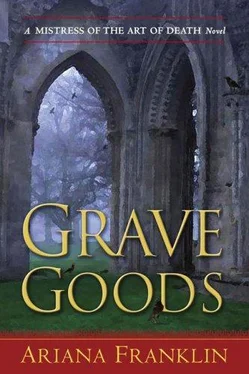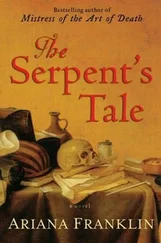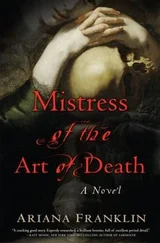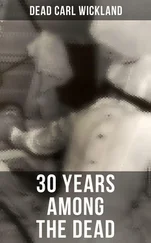There was no cause to think otherwise; the woman was undoubtedly deranged. Equally without doubt, the Pilgrim’s-and the abbey’s-future depended on supplicants coming to the grave of King Arthur.
And yet, to Adelia now, it didn’t answer. It could only have been Hilda who’d tried to bury Mansur and herself-the woman had a positive propensity for entombing people. Such savagery argued a deeper, more urgent reason, if reason there was.
Adelia moved on to peer at the body nearest the door. Millie, thank God. The girl was breathing steadily. There was a plaster on her head, bound in place with linen. The sallow skin of her face was no paler than it always was. Another one, then, who, with luck, had taken no harm from the desperate night.
The only person missing was Godwyn.
Adelia went out to attend to nature. Rejecting what the gentry called the odeur de merde emanating from the trench latrine with its neatly holed plank that the monks had dug near their kitchen garden-so enriching for the vegetables-she found some convenient bushes, then went to the pump just outside the kitchen itself for a wash.
In the east, the sky was beginning to lighten. Somewhere a thrush was attempting its first song of the day.
It would be dawn soon, and if a merciful God could again extend His munificence and allow the three souls on Lazarus Island to be found alive and well, she, Vesuvia Adelia Rachel Ortese Aguilar, would be forever in His debt.
A figure netting trout from the stew by the light of a lantern gave a hail and came stalking toward her.
Brother Peter appeared friendlier than on their previous meetings. “Here,” he said, “that darky wizard’s a proper marvel, in’t he? Done a good job for”-he paused to wink-”you know who. Think he’d like some of me pumpkins? They’ve come on wonderful well with all this sun, if the storm ain’t ruined ’em.”
Yes, Adelia told him, sighing, the lord Mansur would be pleased to be rewarded with pumpkins for having saved Will and the tithing.
He lingered. “Heard as there was a right to-do last night. What were you and the bishop doin’ down that bloody hole?”
“Not enjoying ourselves, I can tell you that,” she said.
“Mad as May butter, that Hilda. Allus was. Never could reckon as how poor old Godwyn put up with her.”
Adelia had a thought. “Could you do me a favor, Brother Peter?”
They went to the site of the tunnel, its lid still lying on one side. Adelia couldn’t bear to look into the hole, but, on her instructions, the lay brother clambered down happily enough and emerged with the box and sword left on its steps. They were dry; the water hadn’t reached them-indeed, it had retreated. “What’s these doin’ down there?” he asked.
“Can I borrow your lantern?”
When he gave it to her, she merely thanked him and turned away before he could ask more questions.
…
THE BOX INTRIGUED ADELIA; to have been placed so deep in the tunnel suggested that its contents were of value. Or incriminating. Or both. Emma’s jewels, probably. In which case, what happiness-if Emma were still alive-to return them to someone who had been suffering all the privations of a castaway as an earnest that she was to be restored to her former life.
Then, like Pandora before her, Adelia thought, To hell, I just want to know what’s in the thing.
There was time to open it before the rescue began, and no need to wake the people in the kitchen before then, which she undoubtedly would if she went there-a noisy business if the box’s hasp continued to prove as obdurate as it had.
She took lantern, sword, and box to the only place where there was both privacy and a table.
Despite the poverty of their resting place and the drenching the storm had inflicted on the cloths that covered them, the forms of Arthur and Guinevere retained the dignity accorded to all the dead in silent immobility.
It was disturbed as Adelia, apologizing to them, shoved the covering away from Arthur’s feet and placed the lantern between them before committing the same indignity on Guinevere by positioning the box between hers.
She left the door open to add what natural light there was to that of the lantern.
It was a noisy business. Inserting the sword tip under the hasp was difficult and caused much scratching and, on Adelia’s part, much swearing under her puffing breath.
At last the hasp yielded its grip on the prong. Adelia put the sword down and lifted the box’s lid.
Not jewels. Bones. Pelvic bones.
Behind her, somebody coughed.
Adelia swung round like someone guilty, hiding the box with her body.
Godwyn stood in the doorway. Godwyn the good thing, to whom she owed her life and Rowley’s and, perhaps, Emma’s. Godwyn the bad thing, who had permitted an uncontrollable wife to try to silence those who’d incommoded her. Godwyn, who had done nothing to stop Millie being beaten.
“What do you want?” she snapped. She was being interrupted on the brink of discovery, and she did not want him to see the box; it might be his, but its contents most certainly were not.
Anyway, there was a terrible patience to the man, which made her nerves twang. He didn’t move, face impassive; only his eyes showed the resignation of an ox awaiting the fall of the poleax.
“You’ll speak for her, lady, won’t ee?” he said. “The bishop do think high of you; you’ll tell him as she ain’t in charge of what she does. Iffen she’s taken to court, a word from his lordship to the judges… make a mort of difference that would…”
Adelia shook her head, not in negation but to clear it. After all, she supposed she had a duty to listen to this man who had given back the lives that the woman he was pleading for had tried to take away.
He continued to talk, had probably been pacing half the night preparing his speech of mitigation.
“Iffen you’d a seen her when she were a girl, hair like fire, full of chatter as a cricket… She were a sight then, my Hilda. Come as milkmaid to the master’s cows when she were eleven year old…”
Concentrate. There was something here, some insight into why a pretty milkmaid had turned murderous.
“The master?” Adelia asked, to get things clear. “You mean Abbot Sigward?”
“Lord Sigward as he were then, abbot as is now. Me, I started off as his stable lad, do ee see, bound to his family like my father afore me and his father afore that. Good masters to us, all of ’em, so long as we did our jobs and served them proper. I got raised to chief stabler, and Hilda, she was made housekeeper.”
“Did you always love her?” The question was an impertinence. Adelia was taking advantage of someone who was her helpless supplicant, but she was impelled to ask it; in the relationship between this man and his wife had to be a clue to what had gone on.
He was puzzled, offended. If he hadn’t been begging for Adelia’s help, he would have walked away. “Fine worker, Hilda,” he said. It was the only answer he could give; love was a word restricted to the nobility and poets. He tried to smile. “Worth the wooing, she was. Took a bit of doing, mind. Her wouldn’t look at me for years.”
“Because she loved the master?” She was probing deep, but somewhere under her scalpel was the source of infection.
Godwyn was stung into indignation. “Never any uncleanness between em,” he said, “never. Half the time he didn’t know as she were there. Still don’t.”
No, he didn’t; Adelia had seen that for herself. Abbot Sigward’s kindness to his former housekeeper was that of a master to a pet hound. “But you went on serving him?”
Again, the man was puzzled. “He were my lord. Weren’t his fault, weren’t Hilda’s, weren’t mine. ’S how it was. Service, see. Good servant, good master, one loyal to t’other.”
Читать дальше












